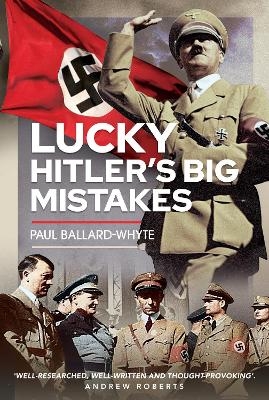
Lucky Hitler's Big Mistakes
Seiten
2022
Pen & Sword Military (Verlag)
978-1-3990-7437-7 (ISBN)
Pen & Sword Military (Verlag)
978-1-3990-7437-7 (ISBN)
Well researched analysis of Hitler's military judgment, strengths and weaknesses.
Adolf Hitler's Great War military experiences in no way qualified him for supreme command. Yet by July 1940, under his personal leadership the Third Reich's armed forces had defeated Poland, Czechoslovakia, Holland, Denmark, Norway, Belgium and France. The invasion of Great Britain was a distinct reality following Dunkirk. Hungary, Bulgaria and Romania had become allies along with the acquiescent military powers of Mussolini's Italy and Franco's Spain. These achievements prompted Field Marshal Willem Keitel, the Wehrmacht's Chief of Staff, to pronounce Hitler to be the Greatest Commander of all time'.
Storm clouds were gathering, most notably the disastrous decision to tear up the treaty with the Soviet Union and launch Operation Barbarossa in 1941. As described in this meticulously researched and highly readable book, Hitler's blind ideology, racist hatred and single-mindedness led him and his allies inexorably to devastating defeat. How far was it good luck that gave Hitler his sensational early political and military successes? Certainly fortune played a major role in his survival from many assassination attempts and sex scandals. The author concludes, from 1941 onwards, the Fuhrer's downfall was entirely attributable to military misjudgements that he alone made.
Lucky Hitler's Big Mistakes exposes the enigmatic Dictator for what he really was - incredibly lucky and militarily incompetent.
Adolf Hitler's Great War military experiences in no way qualified him for supreme command. Yet by July 1940, under his personal leadership the Third Reich's armed forces had defeated Poland, Czechoslovakia, Holland, Denmark, Norway, Belgium and France. The invasion of Great Britain was a distinct reality following Dunkirk. Hungary, Bulgaria and Romania had become allies along with the acquiescent military powers of Mussolini's Italy and Franco's Spain. These achievements prompted Field Marshal Willem Keitel, the Wehrmacht's Chief of Staff, to pronounce Hitler to be the Greatest Commander of all time'.
Storm clouds were gathering, most notably the disastrous decision to tear up the treaty with the Soviet Union and launch Operation Barbarossa in 1941. As described in this meticulously researched and highly readable book, Hitler's blind ideology, racist hatred and single-mindedness led him and his allies inexorably to devastating defeat. How far was it good luck that gave Hitler his sensational early political and military successes? Certainly fortune played a major role in his survival from many assassination attempts and sex scandals. The author concludes, from 1941 onwards, the Fuhrer's downfall was entirely attributable to military misjudgements that he alone made.
Lucky Hitler's Big Mistakes exposes the enigmatic Dictator for what he really was - incredibly lucky and militarily incompetent.
Paul Ballard-Whyte was born in Aberdeen and now lives in Oxford, England. He studied British history at Sunderland University and graduated with a First Class Honours Degree. He is married with two adult children; his son is a Major in the British Army. Before becoming Head of History and rugby coach at an Oxfordshire Prep School, he was a successful businessman in Travel, Personnel, Restaurant and Hotel businesses, a Parliamentary Candidate in two General Elections, a Formula 2000 racing driver with the JKR Team, Scottish Superkart Champion and an Epee Bronze medallist. He has recently published a short story set in Afghanistan titled The Three Birthdays' and has previously written and directed several short films.
| Erscheinungsdatum | 18.11.2022 |
|---|---|
| Zusatzinfo | 120 integrated B&W images |
| Verlagsort | South Yorkshire |
| Sprache | englisch |
| Maße | 156 x 234 mm |
| Themenwelt | Geschichte ► Allgemeine Geschichte ► 1918 bis 1945 |
| Geschichte ► Teilgebiete der Geschichte ► Militärgeschichte | |
| ISBN-10 | 1-3990-7437-7 / 1399074377 |
| ISBN-13 | 978-1-3990-7437-7 / 9781399074377 |
| Zustand | Neuware |
| Haben Sie eine Frage zum Produkt? |
Mehr entdecken
aus dem Bereich
aus dem Bereich
ein Psychologe erlebt das Konzentrationslager
Buch | Hardcover (2024)
Kösel (Verlag)
CHF 30,80
Mythos „Stauffenberg-Attentat“ – wie der 20. Juli 1944 verklärt und …
Buch | Hardcover (2024)
Goldmann (Verlag)
CHF 33,55


